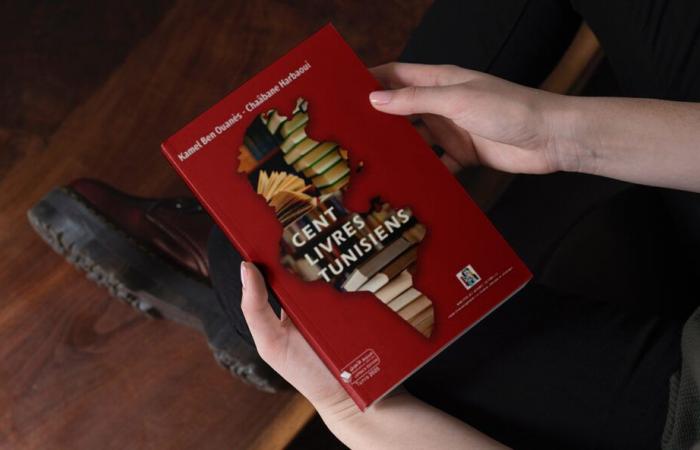
With the support of the Fund to Encourage Literary and Artistic Creation from the Ministry of Cultural Affairs, Majmaâ Al-Atrash Editions published a collective work in French entitled “Cent Livres Tunisiens”, under the direction of Kamel Ben Ounas and Chaâbane Al-Harbaoui. This book brings together a selection of 64 works in Arabic and 36 in French, published between the 2nd and 21st centuries, testifying to the cultural and historical richness of Tunisia.
This volume of 214 pages, in large format, was produced thanks to the contribution of numerous academics and researchers specializing in literary heritage, literary and cinematographic criticism. Among them are Adel Ben Youssef, Ahmed Mahfoudh, Amel Chniq, Chaâbane Al-Harbaoui, Issam Marzouki, Kamel Ben Ounas, Salah Al-Gharbi, and Younes Ben Hajria, the latter having ensured the general coordination of this ambitious project.
In their introduction, the editors of the work explain that this selection does not claim absolute objectivity or a hierarchy of works. It is based on an assumed subjective choice, without devaluing the titles not selected. The contributors’ objective was to offer readers a panorama of works reflecting, in one way or another, Tunisian identity. These works explore the culture, customs, and social and political developments of the country, whether approached with seriousness, humor or subtlety.
A rigorous method and an informed choice
The hundred titles selected were taken from an initial list of 1,253 works covering various genres and disciplines. The coordinators favored Books which present points of convergence, thus drawing a common thread around the historical and cultural continuity of Tunisia. This approach highlights aspects of the Tunisian way of life and social and political history through the ages.
The selected works cover a wide range of genres: ancient stories, social and cultural studies, historical essays, novels, short stories and poetry. Classified in chronological order, they offer a dive back in time. Each work is presented on two pages: one devoted to the book and the other to its author.
Among the novels mentioned are major works such as The Golden Ass by Apuleius, La Degla dans ses Palmes by Bechir Khraief, Le Barrage by Mahmoud Messadi, The Trial of the Dog by Abdeljabbar El Ach and The Night of the Ten Years by Mohamed Salah El Jabri. Other notable titles include The Waiting for Life by Kamel Zoghbani, The Year of Terror 1864 by Hassine Ben Ammou, The Resurrection of the Assassins by Hédi Timoumi, The House of Nobles by Amira Ghenim and Petits Détails by Noureddine Aloui.
French-speaking works also occupy an important place with authors like Azza Filali, Hala Béji, Abdelwahab Meddeb, Mohamed Harma and Samir Makhlouf. Classics such as La Muqaddima by Ibn Khaldoun, Ithaf Ahl Al-Zaman by Ibn Abi Dhiaf and Aqwam Al-Masalik by Khayreddine Pasha also feature.
A tribute to poetry and heritage
The book also pays homage to Tunisian poetry, notably with collections by Mohamed Sghaier Ouled Ahmed, Mohamed Ghazi, Aboulkacem Chebbi and Manour Smadhah. Finally, essays such as How the Tunisians became Tunisians by the historian Hédi Timoumi and The Great Discord by Hichem Jaït enrich this unique panorama.
Cent Livres Tunisiens stands out for its ambition to connect literary works to Tunisian history and identity. This collective work thus offers readers a valuable tool to explore and understand the multiple facets of Tunisian culture and society through the prism of literature.





